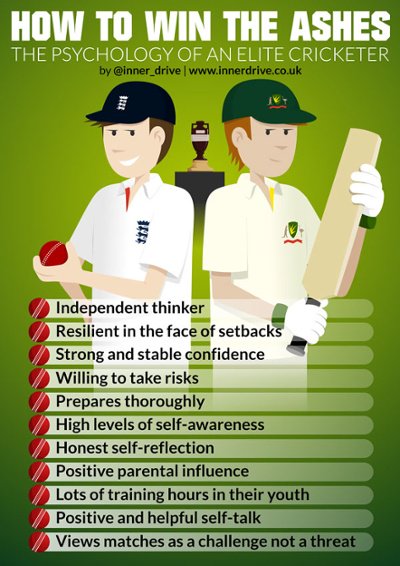Who is going to win the 2019 Ashes? Will it be a ‘golden summer’ for English cricket as England look to build on their World Cup success by reclaiming the urn from the Australians? Will Joe Root’s England or Tim Paine’s Australian side be successful? Either way, many are tipping this Ashes series to be a classic.
Andrew Strauss once said: ‘There’s test cricket and there’s Ashes cricket. The two are completely different’. So, what specific skills will it take for England to Bring the Ashes home?
There are many ways to try to predict the answer to this, which pundits and cricket fans are currently hard at work on as the first test gets under way. We turned to research from sport psychology to try and identify what separates the best cricketers in the world from the rest. Essentially, in this blog, we will figure out the answer to this question: what are the psychological attributes needed to win the Ashes?
Being Psychologically Strong
Mental toughness is essential for elite cricketers. The long periods of competition, being away from home and international media scrutiny can easily take their toll on even the best players. Research has found that there are 4 key components to developing mental toughness in cricket. These included:
- Developing a tough character – this requires independence, resilience and confidence.
- Having tough attitudes – an elite cricketer is one willing to take risks and who believes in the power of preparation.
- Self-awareness – being focused on the game and honest with yourself about your performance will help.
- Environmental influence – cricketers need a good environment to grow as players. This means surviving early setbacks to keep going. For younger players, this requires positive parental influence.
It is interesting to note that many of these areas are also mentioned in separate sport psychology research on what makes Olympic Champions so resilient. Although the context in cricket is different from any other sport, the principles underlying expertise for athletes may remain the same.
Practice Makes Perfect
An interesting study explored the impact that training had on performance in cricket. In the study, batsmen had to predict where the ball was going to be bowled by the opposition. The ones who were able to accurately guess were labelled ‘high performers’ and the ones who weren’t were ‘low performers’. When their playing history was then analysed, it was found that the high performers had spent considerably more time practising when they were aged between 13-15 years old.
This finding mirrors results from other areas, such as chess, and might suggest that the best players we are going to see in the 2019 Ashes are the ones that practiced the most from a young age. For more information on this, check out our blogs on how to maximise training and developing a culture of excellence in youth athletes.
Better Self-Talk
Research has shown that the way someone talks to themselves has a significant impact on how they think, feel and behave – it is even linked to their mindset and confidence. In the context of one of the most important cricket competitions in the world, we can see how these parameters would impact a cricketer’s performance…
A study which considered the use of self-talk in elite cricketers found that it helps increase focus and self-belief and reduces anxiety during performance. This was found to be especially helpful for when the batsmen walked to crease for their first ball and when facing a new bowler.
One participant used the phrase “ball” as a reminder to focus on the upcoming delivery and to help block out potential distractions. This suggests that something as simple as a one-word statement may help cricketers improve their performance.
Thriving Under Pressure
Do you sometimes begin to worry about something and suddenly feel your heart pumping through your chest? Is there a link between your thoughts and your heart rate, and what effect does this have on performance?
Well, one experiment answered this question: this study put 42 academy cricketers through a pressurised batting test, with their cardiovascular reactions recorded as they were being told of the batting test. Viewing the test as challenge lead to superior performance compared to viewing the test as a threat.
This shift in attitude is one of the key components of performing better under pressure. Others include complete and deliberate focus, positive thinking, heightened awareness… Find out more on our blog about performance under pressure.
What Makes a Great Team?
In a study of team effectiveness in cricket, 21 players, coaches and a sport psychologist who had worked within professional cricket were asked to take part in an interview to help understand what makes an effective, cohesive team – and what separates it from just a collection of individual players.
They report that having clear values, communicating regularly, understanding everyone’s roles and having strong leadership were all important. To find out more about ways to develop a winning team culture, check out this blog.
Can You Learn the Mental Skills Required for Cricket?
Now that we have found which mental attributes and skills are required for elite performance in cricket, it’s interesting to ask: how can a cricketer improve these?
One study looked at the effects of a mental skills training package on consistency and performance for cricketers. The training included topics such as:
- Goal setting
- Self-talk
- Imagery
- Concentration
These were all found in previous research to be highly relevant in cricketing performance. The results found that both consistency and overall performance improved as a result of mental skills training. This suggests that an easy way to improve these traits is to work with a sport psychologist.
Final Thought
Whoever wins the Ashes this year is going to have to play some great cricket. Of course, technical execution and tactical awareness will play a huge role, but what will be key is the ability to perform under pressure. Being able to maintain confidence and concentration over a long period of time will prove to be essential to this.





